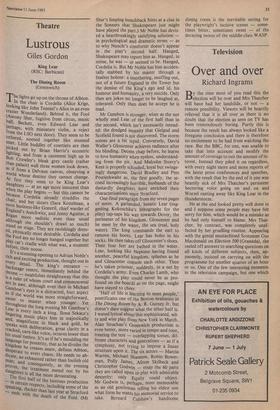Theatre
Lustrous
Giles Gordon King Lear (RSC: Barbican) The Dining Room (Greenwich)
The lights go up on the throne of Albion. In the chair is Cordelia (Alice Krige, looking like John Tenniel's Alice in an even crazier Wonderland). Behind it, the Fool (Antony Sher, fugitive from circus, music hall, Beckett, even Edward Lear and perhaps, with miniature violin, a reject from the LSO next door). They seem to be tethered, noosed together like stunned steer. Little huddles of courtiers are then picked out by Brian Harris's eccentric lighting, and from a casement high up in Bob Crowley's bleak grey castle (rather than palace) wall three women look down, as if from a Delvaux canvas, observing a world whose destiny they cannot change. At first they seem to be King Lear, s daughters — at an age more innocent than when the play begins — but this cannot be because Cordelia already straddles the chair, and her sisters (Sara Kestelman, a most business-like Goneril, chief warder of England's Auschwitz, and Jenny Agutter, a Regan more sadistic even than usual although she shouldn't drawl so much) stand on stage. They are ravishingly dress- ed, physically most desirable. Cordelia and the Fool are no longer hanged together but play cat's cradle with what was, a moment before, their noose. ft's a stunning opening to Adrian Noble's rich and exciting production, thought out in every detail. The king's entrance backstage centre, immediately behind the throne — establishes straightaway that this is a ruler of whom court and commonweal are in awe, although even then in Michael Gambon's eyes is a distracted, hurt aspect as if the world was more straightforward, easier to master when younger. Yet throughout the long evening Mr Gambon's Lear is every inch a king. Ilona Sekacz's lingering music plays him in majestically and, magnificent in black and gold, he speaks with deliberation, great clarity in a cracked, cave-like voice, octaves lower than his usual timbre. It's as if he's moulding the language for posterity, that as he divides the kingdom he creates anew, defines Albion, desperate to avert chaos. He needs to ab- dicate, an exhausted rather than foolish old man; and consequently, as the evening proves, the treatment meted out by his daughters is all the more devastating.
The first half of the lustrous production . — certain respects, including some of the speaking, slacker than last year at Stratford — ends with the death of the Fool. (Mr Sher's limping hunchback hints at a clue in the Sonnets that Shakespeare just might have played the part.) Mr Noble has devis- ed a heartbreakingly satisfying solution in psychological and dramatic terms — as to why Nuncle's comforter doesn't appear in the play's second half. Hanged, Shakespeare may report him as. Hanged, in mime, he was — or seemed to be. Hanged, Cordelia is. But Mr Noble has him acciden- tally stabbed by his master through a feather bolster: a smothering, snuffing out, not of a future England in the Tower but the demise of the King's ego and id, his humour and humanity, a very suicide. Only then are jokes no longer to be laughed at, tolerated. Only then does he accept he is mad.
Mr Gambon is stronger, wiser as the not wholly mad Lear of the first half than in the second, which isn't necessarily intend- ed: the dredged insanity that Gielgud and Scofield found is not discovered. The storm scenes are a bit tepid. Conversely, David Waller's Gloucester achieves radiance after his blinding. Decent chap before, he learns to love humanity when eyeless, understand- ing from the pit. And Malcolm Storry's Kent is properly schooled, loyal but swinge- ingly dangerous. David Bradley and Pete Postlethwaite as, the first goodly, the se- cond increasingly horrible, husbands of the dastardly daughters have enriched their characterisations since Stratford.
One final paragraph from my seven pages of notes. A garlanded, lunatic Lear (sug- gesting Kokoschka's lithographs for the play) tap-taps his way towards Dover, the perimeter of his kingdom. Gloucester and he meet by the water, the sea (real, holy water). The king commands the earl to remove his boots. Lear has holes in his socks. He then takes off Gloucester's shoes. Their four feet are bathed in the water. Lear, looking like Neptune having found another, peaceful kingdom, splashes as he and Gloucester console each other. Then he's taken prisoner, suddenly, in a net by Cordelia's army. Even Charles Lamb, who thought the play could never be as pro- found on the boards as on the page, might have stayed to cheer.
`Half of life is learning to meet people,' pontificates one of the Boston brahmins in The Dining Room by A. R. Gurney Jr, but doesn't dare suggest what the other half is. I waxed lyrical about this sophisticated, wit- ty and wise play from New York in March.
Alan Strachan's Greenwich production is even better, more varied in tempo and tone,
treating the text — overlapping scenes, dif- ferent characters and generations — as if a symphony, not trying to impose a linear structure upon it. The six actors — Marcia
Warren, Michael Shannon, Robin Bower- man, Polly James, Alison Skilbeck and
Christopher Godwin — essay the 60 parts
they are called upon to play with admirable dexterity: only Equity could object. Mr Godwin is, perhaps, most memorable as an old gentleman telling his eldest son what form he wants his memorial service to take. Bernard Culshaw's handsome dining room is the inevitable setting for the playwright's incisive scenes — some- times bitter, sometimes sweet — of the decaying mores of the middle-class WASP.










































 Previous page
Previous page